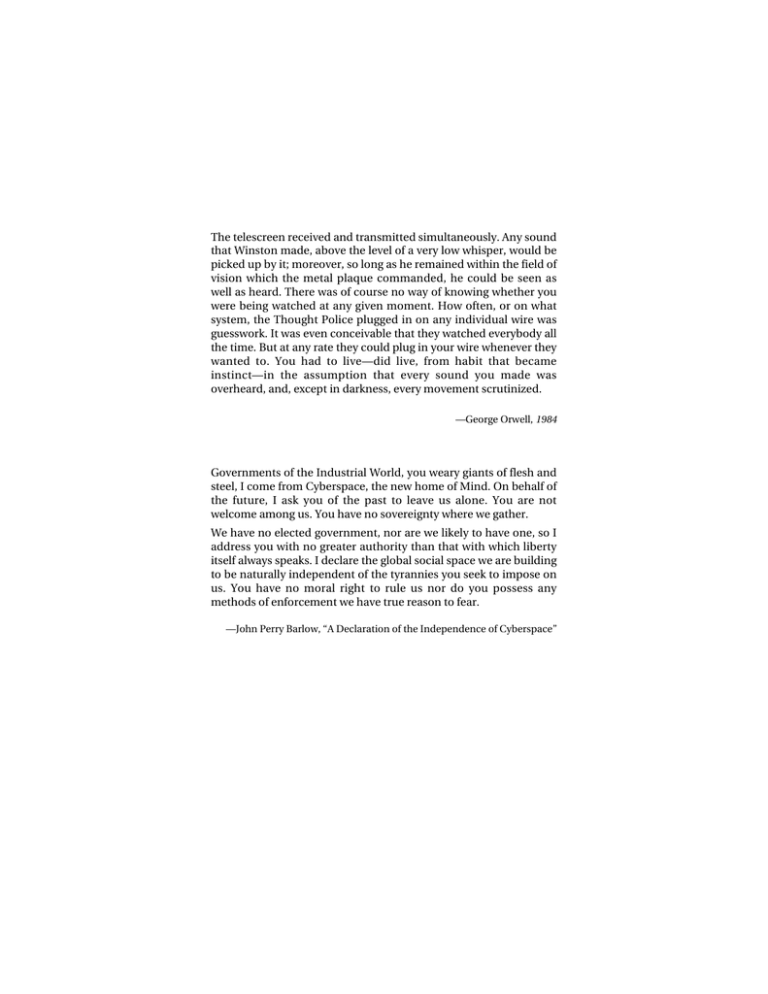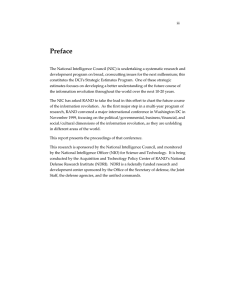The telescreen received and transmitted simultaneously. Any sound
advertisement

The telescreen received and transmitted simultaneously. Any sound that Winston made, above the level of a very low whisper, would be picked up by it; moreover, so long as he remained within the field of vision which the metal plaque commanded, he could be seen as well as heard. There was of course no way of knowing whether you were being watched at any given moment. How often, or on what system, the Thought Police plugged in on any individual wire was guesswork. It was even conceivable that they watched everybody all the time. But at any rate they could plug in your wire whenever they wanted to. You had to live—did live, from habit that became instinct—in the assumption that every sound you made was overheard, and, except in darkness, every movement scrutinized. —George Orwell, 1984 Governments of the Industrial World, you weary giants of flesh and steel, I come from Cyberspace, the new home of Mind. On behalf of the future, I ask you of the past to leave us alone. You are not welcome among us. You have no sovereignty where we gather. We have no elected government, nor are we likely to have one, so I address you with no greater authority than that with which liberty itself always speaks. I declare the global social space we are building to be naturally independent of the tyrannies you seek to impose on us. You have no moral right to rule us nor do you possess any methods of enforcement we have true reason to fear. —John Perry Barlow, “A Declaration of the Independence of Cyberspace” PREFACE This report analyzes political use of the Internet by Chinese dissidents and the Chinese government’s strategies to counter this activity. For this report, a broad definition of the term dissident is employed that includes not only political dissidents active in the People’s Republic of China (PRC), but also activists residing overseas, members of the Falungong group, Tibetan exiles, and others who use the Internet for purposes considered subversive by Beijing. The report is based on interviews with numerous government officials in Washington, D.C., and Beijing, as well as discussions with dissidents, Falungong members, human-rights advocates, and academics based in China and North America. The conclusions are also informed by a comprehensive review of the growing academic literature on the political impact of the Internet in China and other authoritarian countries, as well as relevant Western and Chinese media reports. The authors conducted field research in several cities in China and performed extensive data-gathering on the Internet, including visits to hundreds of web sites, chat rooms, and bulletin board sites. The research reported here was initiated in early 2000; the report was revised and updated in January 2002. This study was conducted in the International Security and Defense Policy Center of RAND’s National Security Research Division (NSRD). NSRD conducts research and analysis for the Office of the Secretary of Defense, the Joint Staff, the Unified Commands, the defense agencies, the Department of the Navy, the U.S. intelligence community, allied foreign governments, and foundations. v vi You’ve Got Dissent! Comments are welcome; they should be directed to the project’s principal investigator, James Mulvenon; the director of RAND’s International Security and Defense Policy Center, Stuart Johnson; or the director of RAND’s Center for Asia Pacific Policy, Nina Hachigian. James Mulvenon RAND 1200 South Hayes Street Arlington, VA 22202-5050 (703) 413-1100 x5225 E-mail: mulvenon@rand.org Stuart Johnson Director, ISDPC RAND 1200 South Hayes Street Arlington, VA 22202-5050 (703) 413-1100 x5470 E-mail: Stuart_Johnson@rand.org Nina Hachigian Director, Center for Asia Pacific Policy RAND 1700 Main Street, P.O. Box 2138 Santa Monica, CA 90407-2138 (310) 393-0411 x6030 E-mail: Nina_Hachigian@rand.org





